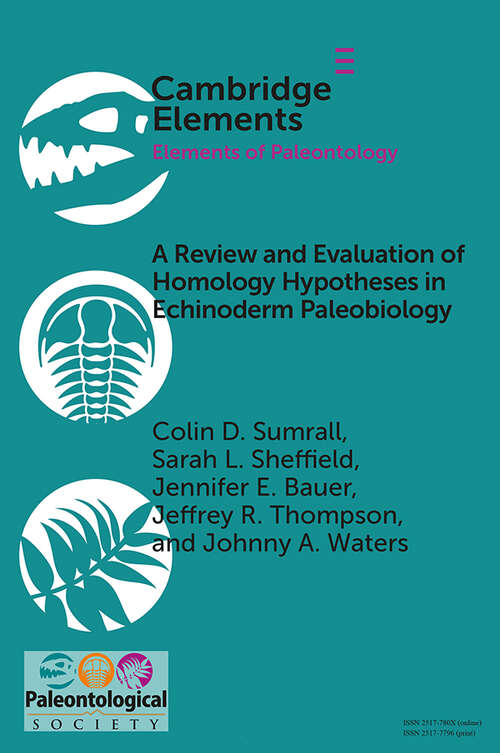A Review and Evaluation of Homology Hypotheses in Echinoderm Paleobiology (Elements of Paleontology)
By: and and and and
Sign Up Now!
Already a Member? Log In
You must be logged into Bookshare to access this title.
Learn about membership options,
or view our freely available titles.
- Synopsis
- The extraxial-axial theory (EAT) and universal elemental homology (UEH) are often portrayed as mutually exclusive hypotheses of homology within pentaradiate Echinodermata. EAT describes homology upon the echinoderm bauplan, interpreted through early post-metamorphic growth and growth zones, dividing it into axial regions generally associated with elements of the ambulacral system and extraxial regions that are not. UEH describes the detailed construction of the axial skeleton, dividing it into homologous plates and plate series based on symmetry, early growth, and function. These hypotheses are not in conflict; the latter is rooted in refinement of the former. Some interpretive differences arise because many of the morphologies described from eleutherozoan development are difficult to reconcile with Paleozoic forms. Conversely, many elements described for Paleozoic taxa by UEH, such as the peristomial border plates, are absent in eleutherozoans. This Element recommends these two hypotheses be used together to generate a better understanding of homology across Echinodermata.
- Copyright:
- 2023
Book Details
- Book Quality:
- Publisher Quality
- ISBN-13:
- 9781009397162
- Related ISBNs:
- 9781009397179
- Publisher:
- Cambridge University Press
- Date of Addition:
- 04/25/23
- Copyrighted By:
- Colin D. Sumrall, Sarah L. Sheffield, Jennifer E. Bauer, Jeffrey R. Thompson, and Johnny A. Waters
- Adult content:
- No
- Language:
- English
- Has Image Descriptions:
- No
- Categories:
- Nonfiction, Science
- Submitted By:
- Bookshare Staff
- Usage Restrictions:
- This is a copyrighted book.
Reviews
Other Books
- by Jennifer E. Bauer
- by Jeffrey R. Thompson
- by Sarah L. Sheffield
- by Colin D. Sumrall
- by Johnny A. Waters
- in Nonfiction
- in Science
